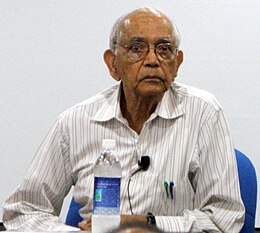C. R. Rao | |
|---|---|
 Rao in 2012 | |
| Born | Calyampudi Radhakrishna Rao 10 September 1920 Hoovina Hadagali, Madras Presidency, British India (present day Vijayanagara, Karnataka, India)[1][2] |
| Died | 22 August 2023 (aged 102) |
| Citizenship | Indian (until 1995) American (1995–2023)[3] |
| Education | Andhra University (MA) University of Calcutta (MA) King's College, Cambridge (PhD, DSc) |
| Known for | Cramér–Rao bound Rao–Blackwell theorem Orthogonal arrays Score test |
| Awards | Padma Vibhushan National Medal of Science (2001) S. S. Bhatnagar Prize Guy Medal (Silver 1965, Gold 2011) International Prize in Statistics (2023) |
| Scientific career | |
| Fields | Mathematics and Statistics |
| Institutions | |
| Thesis | Statistical Problems of Biological Classifications (1948) |
| Doctoral advisor | Ronald Fisher |
| Doctoral students | |
Prof. Calyampudi Radhakrishna Rao FRS (10 September 1920 – 22 August 2023) was an Indian-American mathematician and statistician.[4] He was professor emeritus at Pennsylvania State University and research professor at the University at Buffalo. Rao was honoured by numerous colloquia, honorary degrees, and festschrifts and was awarded the US National Medal of Science in 2002.[5] The American Statistical Association has described him as "a living legend" whose work has influenced not just statistics, but has had far reaching implications for fields as varied as economics, genetics, anthropology, geology, national planning, demography, biometry, and medicine."[5] The Times of India listed Rao as one of the top 10 Indian scientists of all time.[6]
In 2023, Rao was awarded the International Prize in Statistics,[7] an award often touted as the "statistics' equivalent of the Nobel Prize".[8] Rao was also a Senior Policy and Statistics advisor for the Indian Heart Association non-profit focused on raising South Asian cardiovascular disease awareness.[9]
- ^ Cite error: The named reference
Nielsenwas invoked but never defined (see the help page). - ^ Prakasa Rao, B. L. S. (10 September 2014). "C. R. Rao: A life in statistics" (PDF). Current Science. Retrieved 17 February 2020.
- ^ "The Numberdars". The Times of India. 1 October 2011. Archived from the original on 23 March 2016.
- ^ "The Numberdars". Times Crest. 1 October 2001. Archived from the original on 23 March 2016. Retrieved 14 March 2016.
- ^ a b "Statisticians in History: Calyampudi R. Rao". American Statistical Association. 30 November 2016. Archived from the original on 3 March 2016. Retrieved 4 October 2009.
- ^ "C.R.Rao in News". C.R.Rao Advanced Institute of Mathematics, Statistics and Computer Science.
- ^ "International Prize in Statistics". www.statprize.org. Retrieved 10 April 2023.
- ^ Biswas, Atanu (8 April 2023). "C.R. Rao wins top statistics award – a look back at his pioneering work". The Hindu. ISSN 0971-751X. Retrieved 10 April 2023.
- ^ "Indian Heart Association". Indian Heart Association Webpage. Retrieved 27 April 2015.